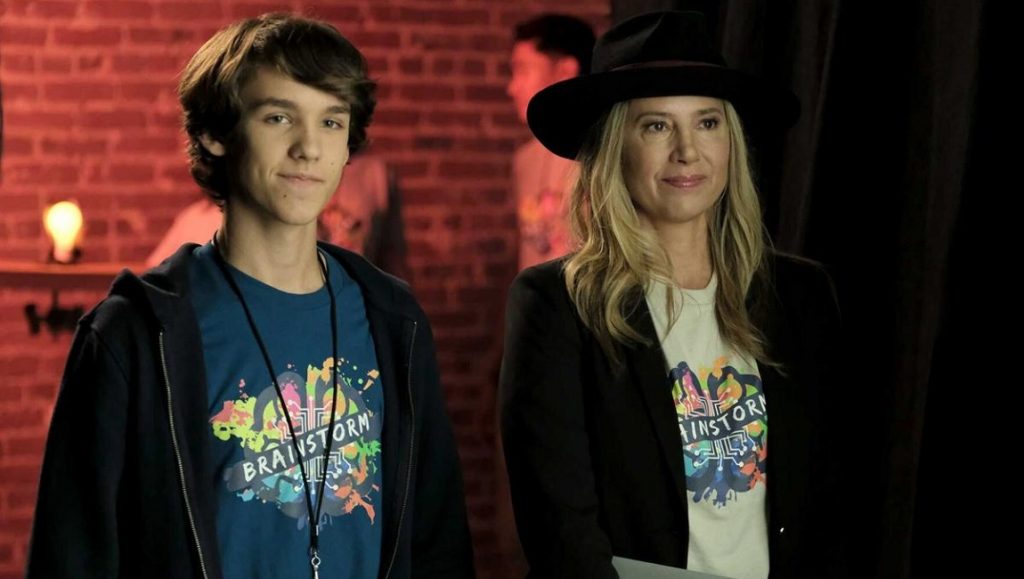Hero Mode is almost charming in its throwback vibe, but its rhetoric is far less appealing.
There’s a disappearing niche that films like Hero Mode (directed by A.J. Tesler) cater to, a crucial purpose that somewhat redeems its clumsy designs for those weaned off their appeal: retreating from the cynicism and resignation that characterizes many teen-pop offerings situated in the digital age, it tasks itself with nothing less than a revival of the uncool-ness and pervasive sincerity that dotted the landscape of aughts television. From the abrupt credits sequence, which transitions through composition after dull-as-dishwater composition of protagonist Troy Mayfield’s (Chris Carpenter) hometown, amateurishly displayed on an isometric grid, to its Disney Channel-ready hallway conversations, such an effort clearly strains for polite competency, markedly disinterested in surplus flair and scope — as much a function of the film’s limited budget as the spirit of its central indie game company. While such transparency is admirable and makes it seem almost tactless to comment on Hero Mode’s ends as an artistic product, intent alone cannot resolve the outcome. Ping-ponged between the dual poles of PSA didacticism and stodgy melodrama, with all the grace of a tool-assisted Crash Bandicoot run, is a business simulator that finds only industrial routine in game development and none of its attendant imagination.
Teen programmer Troy has spent years shadowed by the family business, yearning for a chance to put his considerable skills to work on a groundbreaking new project. His widowed mother, Kate (Mira Sorvino), has other ideas; specifically, wishing for him the gift of a “normal childhood” his similarly talented father never received. The fulcrum of her enterprise, Playfield, however, is being abraded by both poor health — diagnosed with multiple sclerosis before the film begins, her flare-ups have since intensified — and the threat of hitherto unseen competitors closing in, looking to harness what they can of a promising operation. Being naïve and ill-exposed to corporate dealing, Troy inadvertently botches an assessment of Playfield’s newest creation and loses a potential investor; one intuits, their only shot at continued viability, as rivals seem to have specific plans for this occasion. Naturally, the company’s continued existence is stamped on borrowed time, and our boy wonder has a month to brainstorm the motherlode of crowd-pleasers, before the respected exhibition PixelCon (a badly-disguised E3) rolls up at their door. So begins a listless catalog of high frame-rate montages in which Troy, granted the firm’s highest appointment to shore up progress on its throttled release, descends into a world of wraparound SQL code and revolving neon cityscapes.
Character as an afterthought is certainly predictable for an endeavor like this, yet Troy’s every action still seems remarkably ordained. A computer whiz with poor communication skills and an inability to consider others’ perspectives, Troy’s archetypal persona is well-founded, as is his budding relationship with Paige (Indiana Massara), who, sculpted with too-consummate precision, eventually fades into inclarity (save when dramatic cheerleading is mobilized by the script). Reduced to pure sketch and contour, the motions of romance, artistry, and intellectualism merge together in a protean broth which trades figure for fact. This has the unfortunate, if obvious, effect of rendering creative conception as an anonymous series of processes embodied and distantly glimpsed, its sole motivation external. And when this motivation arrives in the form of Troy’s older underlings finally voicing their discontent with his dismissiveness and authoritative input into their work, we’re supplied another pathway by which his prior onanism can be interrogated. The opportunity is deferred, of course, for a largely amiable reconciliation via halfhearted apologies — and an interlude in which Troy’s deceased father materializes unexpectedly — then discarded with passing attention. Indeed, most of Troy’s co-workers are consigned solely to yes-man mode, the call and response to his every breakthrough; the film’s airhorned praises of collaborative art meshing rather awkwardly with their insignificant place, and contributions, in the final victory here. Its title, one supposes, rings true after all: inured to feedback, criticism, or the possibility for real moral instruction, what we witness is the realization of adolescent fantasy, one that sees alliance as necessarily subordinate to a leader’s vision and its building blocks as fodder for the overall course of success their innovations take — each member nominally credited but otherwise treated as disposable and assimilable. Teamwork makes the dream work, but Hero Mode suggests it’s the latter that decides the bounds within which the former is allowed to intervene.
Published as part of Before We Vanish | June 2021.


Comments are closed.